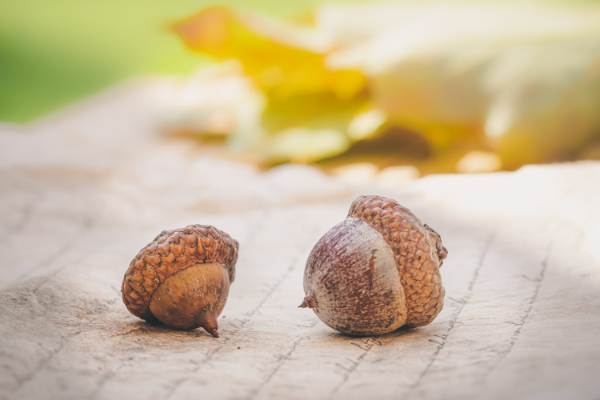Numerous woodland creatures enjoy eating acorns. If acorns are edible, you might be curious. They are, in fact, but you can’t just eat them straight off the tree. To make them edible for humans, some preparation is required. Their nutrients, advantages, and risks are discussed in this article.
What Are Acorns
The oak tree’s fruit is called an acorn. There are about 90 native oak tree species in the US, out of the hundreds of oak tree species that exist worldwide.
The harvest of acorns is simple. They are relatively easy to process and keep well in storage. Like wheat and corn, the majority of acorn species lack flavor. This enables them to be put to use in a variety of ways.
These elements probably contributed to their long history as a primary food source. Assyrians and Greeks, as well as more recent populations like the Chinese and Native Americans, consumed them frequently in antiquity.
Acorns Are Generally Safe To Eat
Acorns have a bad reputation because they contain tannins, a class of bitter plant compounds that can be harmful when consumed in large quantities.
Tannins are regarded as an “antinutrient,” which means they hinder your body’s ability to assimilate vital nutrients from food. High tannin intake can also cause cancer and severe liver damage, among other health problems.
However, when acorns are processed for consumption, frequently by soaking or boiling, the majority of the tannins leach out.
Acorns are rarely consumed raw, despite the fact that there are no studies on their toxicity in humans. Acorns have been eaten safely by humans for thousands of years, in fact.
What To Know About Acorns
Tannins
Acorns have tannins, which have an unpleasant flavor. They can prevent your body from absorbing nutrients and are toxic if consumed in large amounts. Thus, tannin is actually an anti-nutrient. It has been proven that eating and drinking too many foods and beverages high in tannin can harm the liver and cause cancer.
The amount of tannin in different acorn species varies. For instance, compared to white oaks, red oaks produce more bitter acorns and tannins. This is because they germinate at various times throughout the year.
However, tannins in acorns can be eliminated. The water will turn brown as a result of the tannin in the acorns when boiling or soaking them. The acorns must be boiled or resoaked after discarding the old, brown water and replacing it. Until the water stops turning brown, repeat this procedure.
Blending the acorns with water (3 parts water to 1 part acorns) is another way to get rid of tannins. Put this mixture in big jars and store it in the refrigerator. At the bottom, the acorn meal will collect. Once daily, replace the brown water with fresh.
Acorn Pests
Eggs are laid in developing acorns by acorn weevils. Their larvae consume the nutmeat before chewing a hole to escape. Consequently, it’s crucial to ensure that your acorns are free of holes.
Nutrition Of Acorns
Raw acorns weigh 1 ounce (28 grams), and one serving gives you:
- 110 calories
- 6 grams of protein
- 24 grams of fat
- 0 grams of cholesterol
- 12 grams of carbohydrates
- 41 milligrams of calcium
- 1 milligram of iron
- 62 milligrams of magnesium
- 79 milligrams of phosphorus
- 539 milligrams of potassium
Six vitamins, 18 amino acids, and 8 minerals are also present in acorns. Compared to many other nuts, acorns contain less fat. For instance, a 100-gram serving of raw almonds contains 50 grams of fat. The quantity of acorns is only half that.
Another one is peanuts. Per 100 grams, raw peanuts contain 49 grams of fat. Again, acorns contain only half of that.
Health Benefits Of Acorns
Omega-3 Fatty Acids
Acorn oil is a good source of essential fatty acids, just like many other nuts. You must obtain essential fatty acids from foods and beverages because your body cannot produce them. They are crucial components of the membranes that encircle your cells. They serve a variety of other crucial roles, such as energy storage.
Heart Health
Researchers discovered that acorn oil contains more phytosterols than olive, almond, and soybean oils.
Plant compounds known as phytosterols or plant sterols may aid in lowering your LDL or “bad” cholesterol as well as total cholesterol.
Antioxidants
There are more than 60 different phenolics in acorns. These are plant-based substances that function as antioxidants in your body.
Some forms of cell damage may be avoided with the aid of antioxidants. Antioxidant-rich foods are preferred over supplements, according to experts. Such supplements can be dangerous if taken in high doses.
Improve Gut Health
Your overall health greatly depends on the bacteria in your gut. Obesity, diabetes, and bowel conditions have all been linked to an imbalance of these bacteria.
The beneficial gut bacteria are fed by the fiber in acorns, which is a great source of fiber. Acorns are also a traditional herbal remedy for treating stomach aches, bloating, nausea, diarrhea, and other common digestive complaints.
Potential Downsides Of Acorns
Acorns have a lot of advantages, but they could also be disadvantageous.
Raw Ones May Be Unsafe
As was already mentioned, the tannins in raw acorns act as antinutrients by inhibiting the absorption of some food components. They’ve also been connected to a few cancers and, when consumed in large quantities, can harm the liver.
However, this has not been proven by research. Some people claim that eating raw acorns causes nausea and constipation. Additionally, the tannins give these nuts a bitter taste.
As a result, it is not advisable to consume raw acorns.
By boiling or soaking your acorns, you can remove the tannins quickly. Their bitterness is removed during this process, rendering them edible.
May Cause Allergic Reactions
A tree nut, which includes acorns, is one of the most widely distributed allergens in the world.
Actually, up to 1.2% of Americans in the U.S. population are allergic to one or more tree nuts.
Tree nut allergies can cause anything from minor itching, a scratchy throat, watery eyes, and even anaphylaxis, a potentially fatal reaction that can make breathing extremely difficult.
Acorns should not be eaten if you have a nut allergy to other tree nuts unless your doctor gives you the all-clear.

Can Be Difficult To Prepare
Acorn gathering and preparation take time. Despite being common in the wild, they are rarely found in supermarkets.
If you are unable to gather your own, you might need to order them online.
In order to lessen their bitterness and make them safe for consumption, you must also leach them off their tannins. Boiling or soaking can accomplish this.
Despite how easy this process is, some people might find it tedious, especially since other nuts are much more accessible and convenient to consume.
How To Use Acorns
Numerous things can be done with acorns. They can be prepared as much to extract the oil, ground into acorn meal or flour, or eaten whole.
Your raw acorns can be safely leached off their tannins before being roasted for 15 to 20 minutes and then salted as a snack. Acorn brittle, which is similar to peanut brittle, can also be made using roast acorns.
Regular coffee can be replaced with acorn coffee, which is caffeine-free. It can be made by slowly roasting acorns over low heat for about two hours while stirring them frequently. They should be taken out of the heat, allowed to cool, and then ground.
You can purchase acorn flour from some specialty shops and Korean supermarkets if you don’t want to go through the process of cleaning the tannins out of raw acorns. This can be used in recipes for bread. Acorn flour should be used in place of 25% to 50% of the wheat flour in the recipe.
Acorn flour can be used in a wide range of recipes, including:
- Acorn pancakes
- Acorn bread
- Acorn pasta
- Acorn dumplings
- Acorn muffins
Acorn flour can be substituted for nuts in recipes for brownies and cookies. In many recipes, you can substitute it for cornmeal.
For a few weeks, acorn meal and flour can be stored in the refrigerator in a container that is tightly closed. It should last for a few months if you freeze it. Since ground acorn meat contains oil, leaving it in a warm environment will cause it to go rancid.
Acorns should be dried in their shells for 2 to 5 days in direct sunlight or in a 175-degree oven for 20 minutes if you want to store them whole. Keep the oven door slightly ajar so that moisture can escape. Acorns that have been dried out can be consumed for several years.
Conclusion
Acorns that have not been cooked contain tannins, which have a toxic effect on people and make food taste bitter. They are lethal to dogs, cattle, and horses as well. Acorns can be made safe for human consumption by leaching the tannin out of them. Acorns that have been properly prepared are completely palatable and rich in vitamins and minerals like iron and manganese.

